Cast Iron Cooking – What You Need to Know – Care and Cooking Tips
This is a guest post by Jennifer Osuch.
Cast iron cooking was one of the first back to basics moves I made. I wish I could say it was intentional, but the truth is I fell into it out of circumstance. When my sons were younger, my husband and I led their Cub Scout pack.
Over the years of endless camp outs, I learned how to cook in cast iron camping cookware because I wanted my boys to have healthier food than traditional pre-packaged “camp food”.
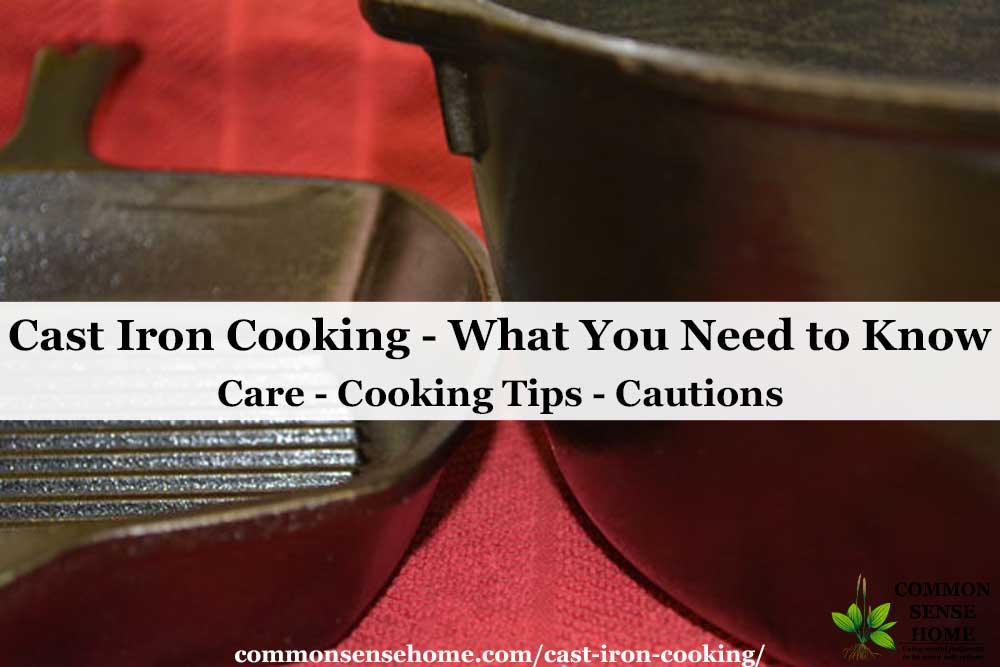
I’m a seasoned (pun intended…) cast iron user and I’ve been battling it, loving it, and learning from this traditional cookware for years. Yes, I say “battling” it because I didn’t know how to take care of it in the beginning.
It’s not hard to take care of cast iron or hard to use cast iron; it’s just a little different. Luckily, the battle is over and now I just love it. Let me share with you what I’ve learned, and what you should know about cast iron cooking.
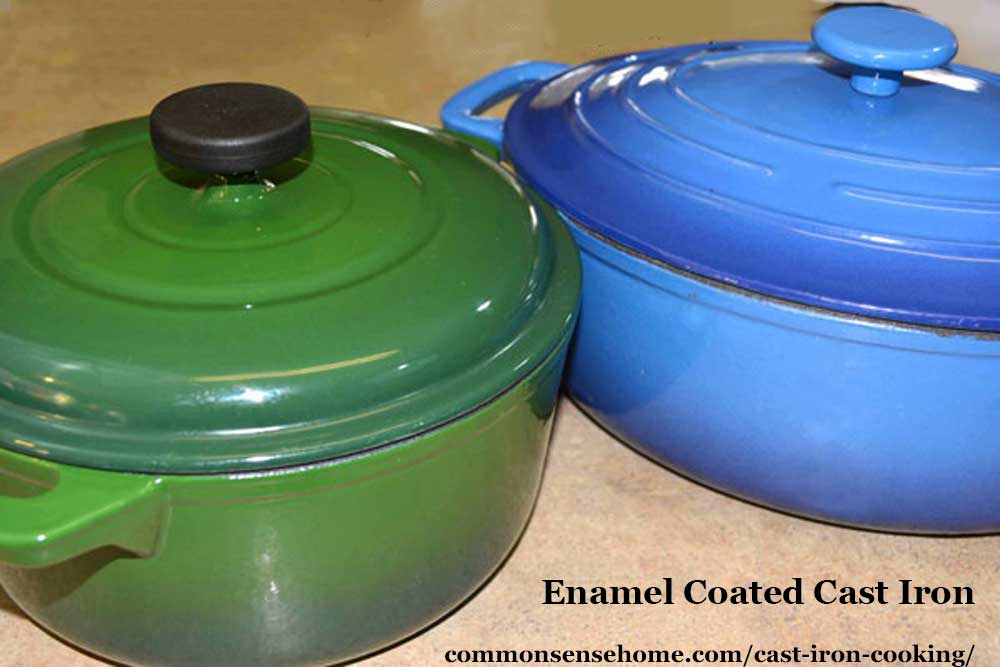
Two Types of Cast Iron Cookware – Traditional and Enamel Coated
There are two kinds of cast iron cookware on the market today, the traditional kind and enamel coated. The traditional kind is usually black (from the seasoning) and is what most people picture in their head when they think of cast iron cookware.
Enamel coated cast iron cookware is simply cast iron that has been coated with enamel for easier care. Enamel coated cast iron is easier to care for in the beginning because you don’t have to season it and you get all the benefits from cooking with cast iron. However, it can be expensive and the coating can scratch or chip.
Enamel coated cast iron also can’t be used in most off-grid cooking situations (except for solar cooking). (If you want cast iron camping cookware, you need traditional cast iron.) I’m going to be talking about the traditional kind of cast iron cookware throughout the rest of this post, since it’s the type that needs a little extra attention.
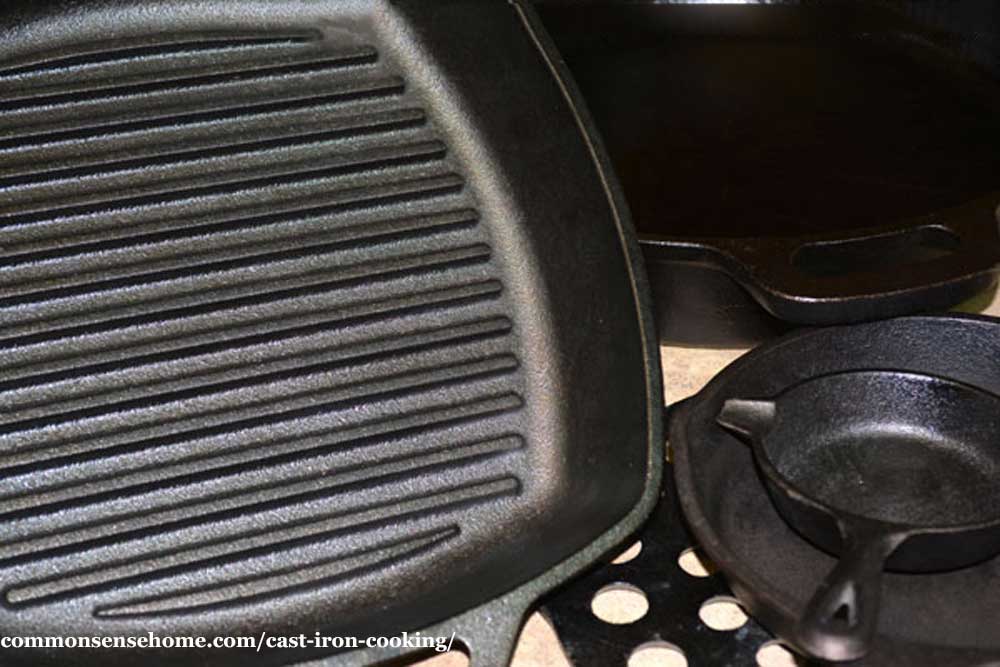
Choosing Your Cast Iron Cookware Pieces
You can purchase almost any size cast iron cookware fairly easily. In recent years, cast iron cooking has become popular again. It’s one of those “what’s old is new again” crazes because people are realizing other cookware is often not safe to cook with. You should purchase cookware based on what you cook most and the size of your family.
Cast Iron Skillets: Most people start off with a 10 in skillet. I recommend 12 in if you have hungry boys like I do. Your skillet can be used for stir-frying, pan-frying, broiling, baking, roasting and simmering. I use my 12 in skillet to cook everything from spaghetti sauce to cornbread.
Cast Iron Dutch Ovens: Dutch Ovens are also called camp ovens. They can be used for larger recipes as a simple pot or they can be used as a slow cooker. When used as a slow cooker they are especially good for cooking large cuts of meat which would otherwise be difficult to cook in an off-grid situation.
They can also be used, as the name implies, as small ovens so you can bake cakes and other treats in them. In order to bake you must have a lid that will allow you to easily place coals on top, since the Dutch Oven must be heated evenly on the top and bottom for baking. Some Dutch ovens have feet, some do not.
Cast Iron Griddles and Grill Pans: You can use a cast iron grill to roast vegetables or a griddle to fry pancakes. The griddle heats evenly so you don’t have a pancake that is done in one area but not in another.
7 Reasons To Try Cast Iron Cooking
1. Off-Grid Cooking
One of the biggest assets to cooking with cast iron is that it can be the only cookware you own. You can cook in any environment with one set of cookware. This saves money and storage room. It also insures that you will have cookware no matter where you are cooking or in what situation you find yourself.
2. Naturally Non-Stick
Cast iron is naturally non-stick because of the patina that forms when you season the cookware. If you treat your cast iron like you would any other non-stick cookware and use appropriate utensils (I use wood), the coating will stay on and prevent food from sticking
3. Lasts Forever
You can’t wear out a cast iron skillet. The truth is that the older they get the better they perform because over time the surface gets smoother. So you save money by not having to replace your cookware every few years.
4. Heats Evenly
As I mentioned above cast iron heats evenly which prevents food from burning and drying out.
5. Non-Toxic
Cast iron cookware is made of, you guessed it, iron… It’s not made of Teflon or some other toxic or questionable material. You can feel comfortable cooking for your family with cookware that has been proven safe through the ages. Actually, if you do cook with cast iron there may be a health benefit – some of the iron leaches into the food to give you a boost in your iron intake.
6. Can Be Used With High Heat
Cast iron cooking is great to go from the stove to the oven to the campfire with no problem. This can save time and effort as you can start a meal in a skillet on the stove and finish it in the same skillet in the oven.
7. Easy Care and Clean-up
Yes, I know some of you are skeptical, but once you get the hang of it cast iron is as easy to care for as any other non-stick cookware.
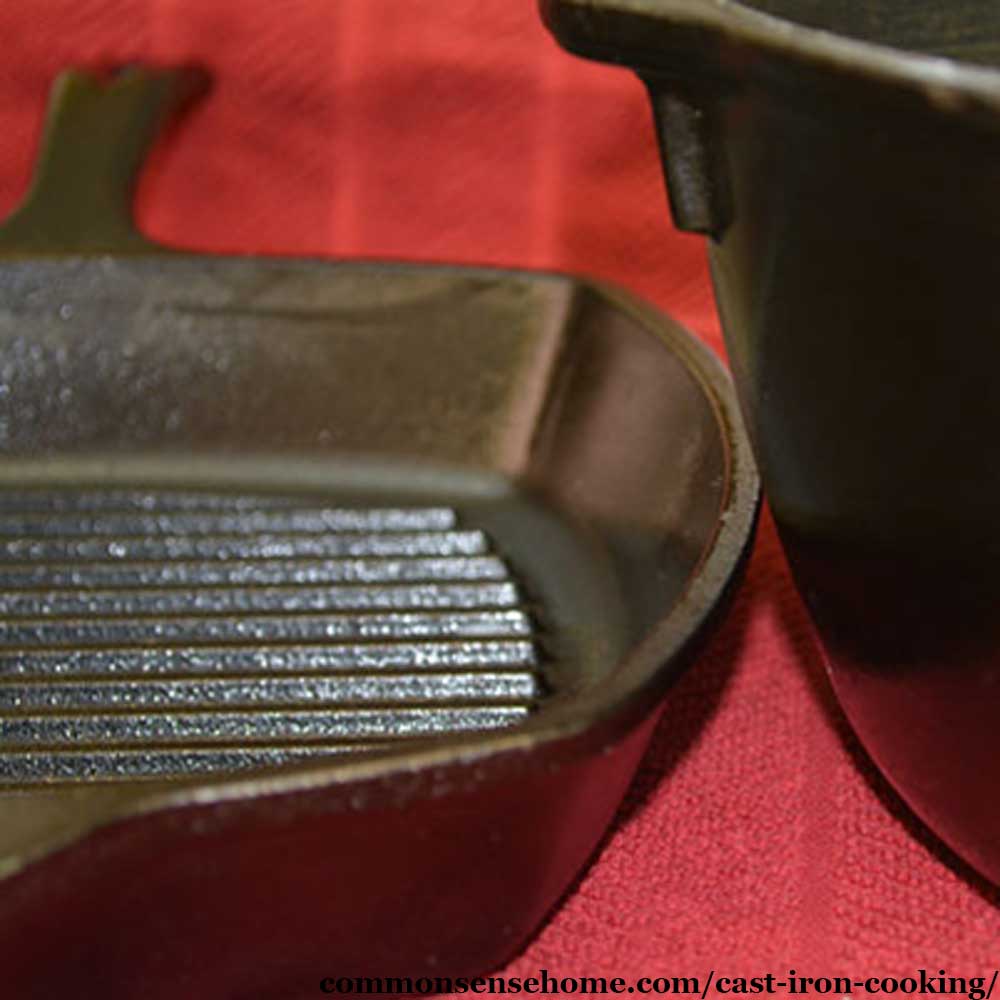
Care Of Traditional Cast Iron Cookware
Food will stick to cast iron if it’s not seasoned. Seasoning is the process of coating cookware with oil and then heating it so a patina (or thin layer) is formed from the cooked oil.
Most cast iron sold today comes pre-seasoned, and the older pieces you might find at a thrift store or yard sale will most likely be seasoned. You may need to reseason pieces that were poorly seasoned, or those that have not received proper care. (See “How To Season Cast Iron Cookware” for seasoning instructions.)
You have to continually add oil or fat to keep your cookware seasoned. If you cook with a lot of oil or fat you might not have to do what I call “maintenance” seasoning. However, most of us try to watch our fat intake, even from healthy fats, and you actually cook with less oil in a well-seasoned cast iron pan.
5 Steps for Cast Iron Routine Care
- Use a non-stick surface scraper to remove unwanted food from the pan.
- Rinse your pan out with water. There is a bit of controversy about using soap to clean your cast iron cookware. Many people swear by not using soap. I generally do not use soap but there is a risk of bacteria staying in the pan. So if someone in my family is sick I might use a bit of soap. The heat will eventually kill the bacteria but it might not kill it right away since the oil application is done at a low temperature. Never place a hot pan or pot in cold water because this could cause cast iron to crack.
- Dry completely. This is important because cast iron will rust if moisture is left on the surface too long. If your pan does rust use steel wool in the affected area. Then proceed to the next step.
- Heat your pan on low to medium heat.
- Apply a thin layer of oil with a lint-free cloth. You can use bacon grease, lard, coconut oil or any other high heat oil. (I use coconut oil.) Applying too much will cause the pan to be sticky. Let it cool and wipe off the excess oil.
There is also some debate as to whether you should do #4 and #5 every time you use your cookware. I do it every time I use my cast iron. If you wait and only do it occasionally it will be more difficult because you’ve let your coating deteriorate. If you get in the habit of doing it each time you’ll never have a problem. Do not place cast iron in the dishwasher – it will rust!
Never store your cast iron cookware with the lid on tight!
You should store your cast iron without a lid to keep rust from forming, especially if you live in a humid environment. I do stack my cookware and sometimes I do store them with the lids loosely on, but I place a brown paper bag in the bottom of the pan or pot to absorb moisture and excess oil.
Cast Iron Cooking Tips
- Pre-heat your pan if frying. Too much heat too fast can also crack a cast iron pan.
- Treat your pan like any other non-stick cookware and do not use metal utensils.
- Cook over low heat. Since cast iron heats evenly you don’t need as much heat.
- Remove acidic foods as fast as possible. Don’t leave spaghetti sauce sitting in your pot. (Acidic foods will have a darker color when cooked in cast iron because of the iron absorption.)
- Do not store food in cast iron cookware. Cast iron will rust from the moisture in the food.
Cautions To Consider
- Do not boil water routinely in your cast iron pots because it will take off the seasoning.
- Cast iron is heavy. This is a good thing for most of us who could use a little weight lifting in our lives, but extra caution should be taken with children and adults with limited mobility.
- Caution should be taken if you suffer from Hemochromatosis or iron overload.
- Also, there is some debate about the type of iron absorbed through cooking with cast iron, as to whether it can be absorbed by the body because it’s not organic iron. You can read more about this at http://learningandyearning.com/cast-iron
Even though I started cooking with cast iron outdoors it quickly made its way into my indoor kitchen for all the reasons listed, and has become my favorite cookware. Even if you’ve been intimidated or frustrated with cast iron cooking in the past I hope you will give this traditional cookware another try. Let me know how it goes!
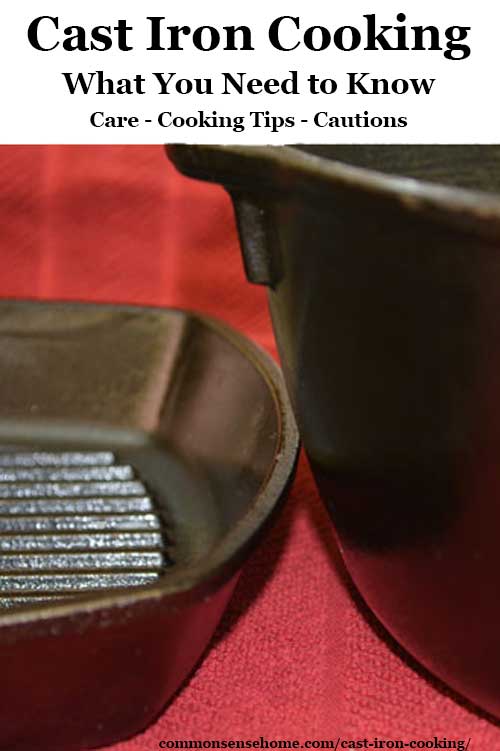
More Cast Iron and Off Grid Cooking
Other posts in the series:
- How to Season Cast Iron Cookware
- How to Restore Cast Iron Cookware – Cleaning and Restoring Cast Iron
- Getting Started with Dutch Oven Cooking
Other Related Posts:
- Emergency Cooking – 10 Ways to Have a Hot Meal when the Power Goes Out
- Getting Started with Solar Cooking – DIY Solar Cooker Ideas, Printable Cooking Guide

This is a guest post by Jennifer Osuch. Jennifer has been prepping, homesteading (suburban style) and pursuing a self-reliant lifestyle for over 12 years.
She is the mother of three very active and wonderful boys, but insists that as many of her possessions as possible be the color pink to remind her house full of boys there is a lady a living among them.
Jennifer enjoys writing, gardening, and the outdoors. She blogs with her husband at the Seed to Pantry School about urban homesteading and becoming self-reliant. You can also find her on Facebook, Pinterest, and Instagram
Originally posted in 2014, last updated in 2018.

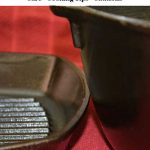
Very timely post. I didn’t use my cast iron this summer because it was just too miserably hot to use the stove. So my cast iron skillets just “went to pot”, and now it’s winter and I’m ready, to get ready, to cook with cast iron again.
The great thing about cast iron is that with a little TLC they’ll be good as new.
I just purchased a carbon steel 12 inch fry pan, I use it and treat it just like my iron pans, Does great. Its a Lodge.
No one should be using a cast iron pot to cook food in unless you have your feritin level checked. If you have iron over load cooking in a cast iron pot can eventually kill you. Look it up hemochromatosis.. not a joke..
Yes, hemochromatosis is mentioned in caution #3.
That’s great , thank you my mom died of complications of hemochromatosis and she used iron pots for cooking. Back then it wasn’t spoken about much.
It’s an issue in my husband’s family, too, which is why we don’t regularly use cast iron, even though it’s good cookware.
I also appreciate finding knowledge about the safety of the Iron and potentially any harmful trace metals that might leach out possibly from be in lowly brand-names in traditional surface cast iron pots/pans.
Other than that 😀 I love and promote cast Iron slow cooking methods.
cook on …. cook on
I have 3 iron skillets I use them for everything but boiling or steaming I have stainless pots for that. I do use a glass top it works fine just don’t drag your pans. Everything I cook works great but I have trouble with scrambled eggs, they stick. Over easy or sunny side up don’t stick just scrambled… Any suggestions?
This is a decent demo of scrambled egg cooking in cast iron, although he overcooks the eggs and uses pre-shredded cheese.
He does have a gorgeous vintage Wagner, so I’m sure that helps, but his technique is good, too. (Until the end, where he cooks the eggs to consistency of hotel buffet eggs.)
Too bad about the glass stove. Is it really that bad? I really like glass cooktops. Gas is an option if it werent for the wife (although she almost never cooks). But I dread the old electric stuff. Building a wood oven in the new garden is a dream thats still a bit off I guess, so no cast iron for now 🙁
I would guess (!) that the ion intake could work. I heard on CBC radio that they are giving people in Africa little iron blocks (shaped like a fish to get them to actually put it in) to put into their pots when cooking. This is for pregnant women that need much iron and apparently many parts of Africa have iron deficiency problems.
I only have one questin. Do you season the bottom of the item? I have one flame cooking device and a glass cook top in the kitchen does that factor in?
Having lived with a glass cook top, I wouldn’t use cast iron on mine, since the glass cook top seemed to scratch and show wear with any sort of rough surface applied to it. Otherwise, yes, the entire surface is seasoned to protect it.
Case Iron is the easiest and most affordable way to cook for me.
Thanks for being part of this. I have been cooking with CI for over 40 years and still learned some new things from you. Thanks
Have two pieces of cast iron so far. A 50 year old skillet that I rescued from sure rust death, and a new Dutch Oven, both Lodge. I NEED MORE!!! Love using it!
Thanks for a chance to win!
I have both of my grandmothers cast iron pans and love them. I don’t have much of it, but what I have, I love to use. 🙂 Thanks for the chance.
Your post is very informative! Very useful information to keep on hand! Cast iron is really great!
We use ours mainly when we camp, but we are slowly getting the hang of using it indoors. The Dutch oven is our next adventure! Thank you for all the wonderful information!
The comment about cast iron improving with age is spot on. I have a collection of cast iron cookware ranging from the smallest frying pan to a rather good sized dutch oven. I got this set from my Mother, who got it from her Mother. . . I’m not sure what the true age is on the original pieces in the set, but it’s well over 100+ years old. Over the years I’ve had the set, I’ve added a couple of newer pieces and although they are okay, I prefer the older pieces. As for washing the cast iron, I hand wash in the same water as my other dishes (soap included). Somehow, I just have a mental block about not using soap to wash cookware. I’m not sure how to compare cooking in cast iron pans to other types as cast iron is all I’ve ever used. But, I can tell you that I recently bought a new set of pots that included a frying pan. Uhmmm, I wasn’t very successful in my first and only attempt at cooking in a lightweight pan. . .
Hi Carol,
There could be a few reasons your food is sticking.The first is you might not be using enough oil or butter. You might consider using a basting brush and bushing the oil on after each pancake, at least until you work up a thick coating. I would really not recommend spray oil. It’s very sticky and has a lot of other things besides oil in it. Coconut oil would be my oil of choice for pancakes. The other reason your food might still be sticking is the quality of the griddle. There are some lower end (albeit newer) cast iron that just does not have a smooth enough surface to cook eggs and pancakes without sticking. If you run your fingers over the surface and it’s bumpy it might be better to save the griddle for burgers and vegetables and look for a new one (probably pre-owned and older) with a smooth surface to cook your pancakes and eggs.
I’m wondering if you could offer some advice…bought a cast iron griddle a few months ago(preseasoned) and am still not mastering it though I use it at least once a week for pancakes or some other breakfast food. I’m still having pancakes sticking quite a bit to the pan…is this normal even though I do use a spray on it since I read that’s recommended for new ones …. any htoughts as to what the problems could be?
would love to win some cast iron cookware…
I married into my cast iron. A tortilla maker and a skillet. I have grown to love them and use them when I can. I think I will start finishing the cookware when I am done using as mentioned above in “Care Of Traditional Cast Iron Cookware” number 4 and 5. I think that will make my life easier.
Thanks for this article and welcome to you Jennifer.
Pam Baker
I love cast iron! Thanks for the wonderful giveaway!
I ruined my mother’s cast iron skillet by using a metal spoon on it. Now there are chips in the patina going down to the original cast iron. Can this be fixed or do I need to replace it? I would hate to have to do so!
Some quick searching online didn’t reveal much help. Some sites seem to indicate that if the chips aren’t deep, the vessel can simply be cleaned and reseasoned. If they are deep, there’s no way to fill in large gouges.
Hi Tina,
You can’t “ruin” a cast iron skillet, unless you crack it! Chips in the seasoning/patina aren’t cracks in the cast iron itself and can be fixed. If there are chips in the patina you can re-season it. First, as Laurie suggests, try filling in the chips with oil and see if they begin to fill in. Cooking with it often and keeping it well oiled should fix it. However if the gouges are just too deep you can strip off the old seasoning and then re-season it. I’m almost positive that will work but if it does not you can also use a dremel tool to smooth out the surface. I would only use the dremel tool as a last resort after you are certain re-seasoning has not fixed the problem, because it will change the texture of the surface and you’ll have to re-season yet again. It’s a weekend project, but if it’s your mother’s skillet I’m sure it will be worth the time and effort to re-season it. Let me know how it goes! My husband just brought home a car full of cast iron pieces from an estate sale. Some are in great shape but some are not. So I have a few weekend projects ahead of me, too…..:)
Hello, I think we could all use a little iron in our diet. Thanks.
This is one of the better articles I’ve seen on cast iron cookware care.
I have one disagreement with your article, though, and that is in the cleaning. I routinely boil a small amount of water in my cast for cleaning specifically for bacterial control and use a fine steel wool to wipe the inside with. I then put it on the low flame to dry all the water and season with lard. I’ve been using the same cast iron for nearly 20 years.
I love cast iron. My mother cooks with it everyday and has long been a part of my life. I would love to win this.
Love your blog post. Thanks for it so very much. I learned a few more crucial things about cast iron cookware that I didn’t know before. I firmly believe that this is the best cookware to cook with and the healthiest for your family. I have the complete Lodge cookware set. My parents blessed my fiancee and I with it two years ago Christmantime to take it camping with us. We never took it camping and never used it and it pretty much sat and collected dust and rust as well. This past year, since I have gotten engaged, I am striving to learn to be more frugal and find safer, healthier alternatives for our family both in the products we use and eat, to become a better homemaker and to prepare for my role as a wife. I cleaned up the cast iron cookware in January and we have fallen in love cooking with it. We constantly use the fry pans. I have only use the Dutch Oven and pot once and I still have to clean up the griddle. We have also gotten rid of all the other ‘hazardous’ pots and pans. You can cook anything in these pots and pans from meat, veggies, pot pies, stir fries, even chocolate chip cookies too! The only thing that I dislike is that the smaller pans and the pot and the Dutch Oven like to rust a bit on a whim when they get wet. I have to make sure everything is all dry when I put them away, If there is even a small amount of water on them, they will get some rust on them. Other than that, I have no other complaints. I strongly encourage those who are seeking a healthier lifestyle to invest in a set of these pans. They will last forever and are totally worth the price you pay for them. These are a great investment! I am not going to enter the giveaway, for I never win these Rafflecopter giveaways anyway and I don’t need another set, but good luck to all whom have entered! 🙂
When you bake chocolate chip cookies, if you have several really small iron fry pans, put one cooky scoop in each pan, then serve them warm in the pan with a scoop of ice cream, drizzled with chocolate sauce. Yum! larger pans? larger cookie scoops, cut in pieces, then add the ice cream with sauce and serve on warm plates.
I LOVE this article. My folks taught me well the care and handling of our cookware…and it’s no that hard or time consuming. So glad someone is teaching younger adults how to care for these priceless treasures.
I grew up using only cast iron and one heavy. thick aluminum stock pot on a huge cast iron wood buring cook-stove
After my parents death, my older sister sold everything, my belongings, my parents things, the house, and the beloved iron cookware.
I would be thrilled to finally have a set again to enjoy. You have no idea what it’d mean to this old lady, NOTHING tastes as good as any food that has the privilege to be cooked in cast iron.
Thanks for the chance to enjoy cooking again!
I started my married life with a couple of cast iron pans, but over the years and gifts of new pots and pans from well meaning family and friends, my cast ironware got pushed to the back and half forgotten. After the last of several Teflon non-stick coated pan sets once again started to scratch and flake, I “re-discovered” why I always enjoyed and could count on my cast iron pieces. I would love to flesh out my little collection and return 100% to cast ironware! Thank you for your excellent article and the “refresher course” on how to care for them!
I have the 12inch skillet and use it for practically everything!! But……I would love to have the Dutch Oven….have never owned one! I’ll be 69 next month and it would be the perfect gift….thanks for the opportunity to win one.
Thanks everyone for all the wonderful comments!
I think we can safely say that your article went over well. 🙂 Do you have any thoughts on Tina’s damaged cast iron?
Welcome to Common Sense Jennifer, I always pick up on something, even if you are self reliant, you can pick up pointers. I enjoy the site, and thanks for the chance to win the cast-iron.
Love cast iron soo much!! A lot of good information, thank you.
Love this article! And love cooking with cast iron!
I did not think I hit the right button to be in contest.
Love my cast iron! Been using it for 50 years! I have an expensive set of pots, but I always go back to use my cast iron skillet and Dutch oven. The older I get the more I teach young one to use it, and how to keep it seasoned! Thanks for opportunities to tell about it!
I would share some of this with my lovely daughter, for without her I would not have purchased some of the pieces I have.
wonderful article…will save it!
Thanks to everyone for this wonderful chance to win! I only have one cast iron pan but I LOVE LOVE LOVE it and DO plan to get more!! 🙂
Love my Cast Iron. The tripod and lid lifter is calling my name!!! :o) Thanks for all the info.
Well, this information sure clears up a great deal. I thought I had tons of questions, but they were all answered just by reading this article I received. Thank you for both the article and a chance at winning some great products.
Great post and welcome aboard. I’ll bet you have all sorts of other wonderful things you could right about also. I love my cast iron and am happy about a chance to win more. esp the dutch oven. I have some fancy smancy pans but my cast iron is my go to.
This was a very informative post. Thanks to all involved for the giveaway.
Thank you for participating in this! I found some other great blogs to follow.
Thank You For This ArtCle, It Answers My Questions About Heat And Cleaning.
I have one cast iron skillet and love it. I’ve had it 42 years.
Love Cast Iron ! Would be wonderful to have a Dutch Oven ! Thanks for the chance at winning ! 🙂